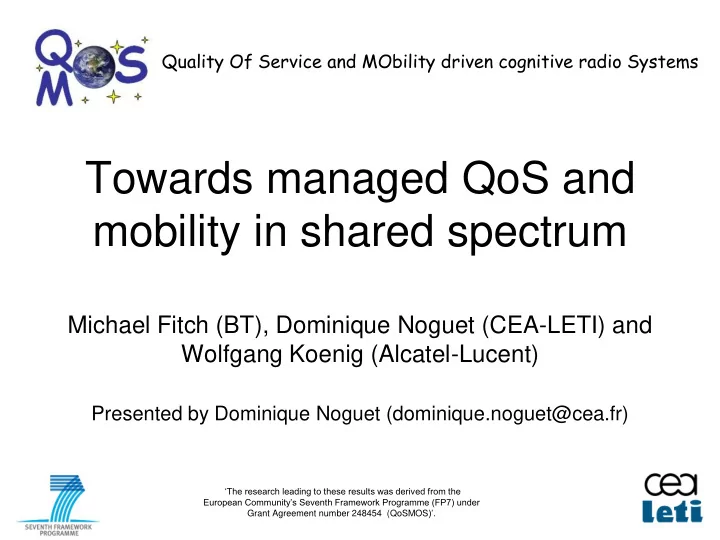

Quality Of Service and MObility driven cognitive radio Systems Towards managed QoS and mobility in shared spectrum Michael Fitch (BT), Dominique Noguet (CEA-LETI) and Wolfgang Koenig (Alcatel-Lucent) Presented by Dominique Noguet (dominique.noguet@cea.fr) „The research leading to these results was derived from the European Community‟s Seventh Framework Programme (FP7) under Grant Agreement number 248454 (QoSMOS )‟.
Outline • Why do we need spectrum sharing (vision) • QoSMOS project and challenges • QoSMOS holistic approach • QoSMOS scenarios • QoSMOS reference model • Flexible PHY for WS • Conclusion
Vision The driver for smart spectrum sharing is that wireless network planning is becoming infeasible Flexible spectrum use is the most efficient means to provide variable data rates Flexible spectrum use is needed to meet wireless demands in the next 20 years
QoSMOS project • QoSMOS - Quality of Service and MObility driven cognitive radio Systems – A research project in EU‟s 7th framework program – Call objective “Efficient Radio Access to Future Networks” – Runs from 2010 – 2012 (3 years) – 15 partners, including operators, equipment vendors and research institutions – An External Advisory Board (EAB) consisting of regulators, broadcasters, pre-standardisation committees and certification organizations • QoSMOS ‟ focus is on mobile services and QoS, which introduces new challenges and possibilities: – More dynamic frequency situation when moving – Handover with no dedicated spectrum – Handling of QoS when the frequency resource varies – QoS class can be linked to frequency choice and can be input to the spectrum management process QoSMOS will research and develop the tools and techniques that allow opportunistic use of radio spectrum where users are moving, while receiving a managed QoS
Some challenges Wireless spectrum will be fragmented in many geographical areas and flexible PHY layer techniques will be required to deal with this. Fairness between sharing users will need to be encouraged, perhaps through a brokerage or co-operation agreement. Etiquette for sharing, is being considered, Protection of primary users, but also fairness amongst secondary requiring a mix of database and sensing technologies Managed QoS and mobility will require integration of the control and management planes from the radio access network to the core networks of the network operators. From there, interworking to the service providers will be needed, which is complicated by wholesale relationships. Work on value chain reference models and economic analyses is ongoing.
A two-tier approach is used for wireless resource management The upper manager is distributed and allocates resource to wireless systems (more short term) The lower manager is centralised and contains the spectrum portfolio (long term or slow changes)
Workplan
QoSMOS scenarios DYNAMIC emergency commercial BACKHAUL Dynamic backhaul Cellular extension RURAL BROAD BAND CELLULAR EXTENSION IN WS longer range shorter range inside-to- emergency outside DTT IN CELLULAR COGNITIVE COGNITIVE AD HOC FEMTO-CELL NETWORK Rural broadband Cognitive ad hoc network commercial indoor non-cellular cellular Direct terminal-to-terminal Cognitive femtocell
Reference model QoSMOS CHALLENGES REFERENCE MODEL CN Mngt End-user Application QoS and Mobility WP2 Management CM-RM WP5 Spectrum CM-SM WP6 Management Technology- Adaptation Layer AL AL agnostic approach Common Context Regulation Spectrum Portfolio WP3 Management Policies Sensing Repository Optimized data WP4 Transceiver transfer in opportunistic band
Motivation for looking Beyond OFDM • Fragmented White Space • Flexible MC approach • Extremely low out-of-band radiation • Digital Implementation • Spectrum pooling OFDM signal with square window first side lobe at -13dB • Multi-branch filter bank approach requires additional filtering • ORData Carriers Adjustable out-of-band radiation Power Level TV Signal • Less CP compared to OFDM • Reconfigurable RF front – end for flexibility . . . Frequency TV Bands IA-PFT, FBMC and GFDM
Interference Avoidance Transmission (IA-PFT) • An OFDM-based-transmitter capable of suppressing out-of-band emission for opportunistic spectrum access in White Space • Parallel concatenation of partitioned frequency-domain (Cancellation Carriers) and time-domain (windowing) processing • 6-12 dB of suppression gain in power spectral density IA-PFT transmitter Power spectral density IA-PFT: Interference Avoidance transmission by Partitioned Frequency- and Time-domain processing
Low leakage / high spectrum efficient PHY • FBMC (OFDM OQAM) relax constraint on orthogonality • Trades off frequency and time domain localization • Higher spectrum efficiency • Higher complexity compared to OFDM, but similar to filtered OFDM Spectral Efficiency Gain relative to OFDM Standard Frequency Time Total Gain Domain Domain DVB-T 10 % 3 % 13 % IEEE 802.11a/g 3.8 % 15.8 % 19.6 %
Summary • QoSMOS address key challenges of future DSA networks • A holistic approach is used and developed in a reference model • Spectrum and resource management is proposed in a 2 tier system vision • QoSMOS propose technical enablers and also look at buisness perspectives • Flexible radio approaches for scalable spectrum aggregation is proposed • QoSMOS is active in standardization (ETSI, IEEE)
Acknowledgement Q S The research leading to these results was M derived from the European Community‟s Seventh Framework Program (FP7) under Grant Agreement number 248454 (QoSMOS). More information from www.ict-qosmos.eu.
Recommend
More recommend